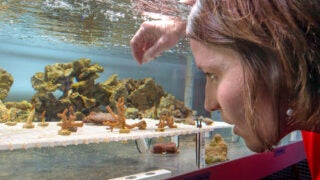Leinart, who led the Trojans to a pair of Rose Bowls and was MVP of the 2004 Rose Bowl, is the 25th Trojan player, coach or administrator elected to the Rose Bowl Hall of Fame.
News Listing
The keyboardist, vocalist, composer and USC Thornton faculty member returns to the Monterey Jazz Festival on Friday. This time, she’s a featured member of the Christian McBride Situation, a funk-powered group that delivers a kaleidoscopic array of African American musical idioms.
Faculty symposiums and a student-focused arts showcase are among the events leading up to Friday’s formal installation ceremony.
Testing will be provided at student health centers on both the University Park and Health Sciences campuses, and is available to undergraduate and graduate students.
New research co-led by USC scientists suggests hundreds of thousands of young adults took up vaping between 2017 and 2018.
The creator of A Discovery of Witches looks back at her “overnight success” that took a decade.
USC researchers have discovered that corals can pass on their reshuffled symbiotic algae, which may help their progeny withstand climate change.
The coolest job ever? David J. Barker blows things up for movies like Avengers: Endgame and Transformers.
A team of USC Viterbi undergraduates will bring their underwater wireless communication technology to the finals of a global student competition.







